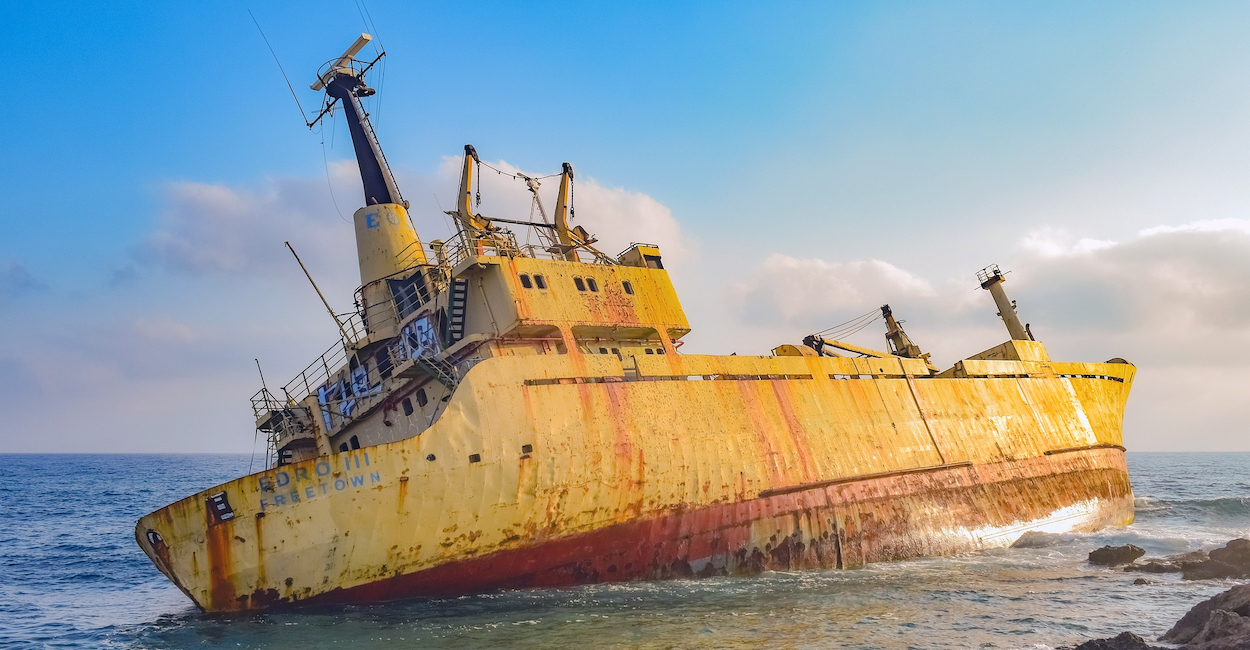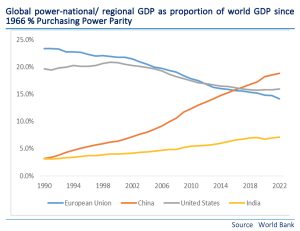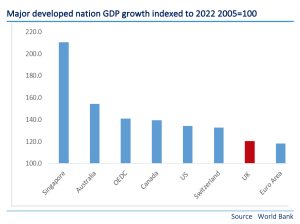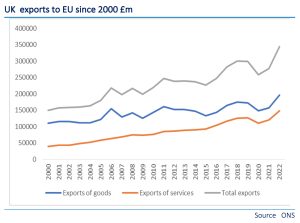By Ewen Stewart – 6 minute read
I WAS SENT a little vignette about how the French establishment sees Brexit, or rather more accurately would like to portray it. Le Figaro is of course the establishment self-proclaimed voice of La France, their equivalent of perhaps The Times, with a bit of FT thrown in – and to them the mad Rosbif have got what they deserved, ‘a total loss of control of their destiny.’ Brexit has been, they say, a shipwreck.
A link to the article is here and translated below, but in essence it describes a collapse in public services, impoverishment of the population, inflation, rising interest rates, mass migration, job shortages , the loss of Scotland as they itch to join The Union (the European Union that is), and a severance from the civilised values of, well, the French. We need to crawl back.
The funny thing is some of Le Figaro’s claims have a ring of truth to them, but they miss two critical points.
Firstly, none of the UK’s decline has anything at all to do with leaving the EU. It is simply down to very poor policy choices from the British Government.
Secondly, things might be bad in the UK but the EU’s performance is even worse and has been for at least a generation. In fact Europe is the standout failure continent on a global basis – bar none. This is a tragedy and a self-inflicted one.
Le Figaro’s article actually underlines all that is wrong with this great continent and reveals the fact that while the UK Government and its refusenik bureaucracy may well have monumentally failed this country the reason is they did so by breaking every manifesto promise under the sun – and in doing so making the UK more like the EU, not less. Despite Brexit they have copied EU failure.
This decline has been exacerbated by the state’s determination to not just maintain every last EU regulation, but to double up and ‘lead globally on regulation’ in a sort of ‘well you can have your Brexit if you like but ha, ha we are globalist now and are even bigger and better at centralise and control’.
Such an approach is the exact opposite of the instructions of the population and subsequent manifesto pledges and inevitably leads not just to decline but a controlled people.
Despite every strategic advantage, Europe, including the UK, is in steep decline. The rate of decline is accelerating. According to the World Bank in 1990 the European Union was the world’s biggest economy on a purchasing power parity (PPP) basis accounting for almost one quarter of the global economy. Today, as is clear from the chart below, it has declined to just over one seventh of global GDP. By 2040 it is likely to be under one tenth. This can and is leading to greater and greater irrelevance.
This decline is a direct result of very low GDP growth, as outlined by the chart below, highlighting aggregate growth since 2005. Over that period Britain’s performance has been pathetic but the clear contrast between the UK and the Eurozone, where growth has been even weaker and other developed nations is stark.
Since 2005 Eurozone GDP has grown by 18.1%, UK by 20.3%, Switzerland by 32%, US by 34%, Canada by 39% and Australia by 54%. This weak growth need not be thus, as other advanced nations have grown by between 50-100% more over the same period so it’s not a question of developing nations catching up when other highly developed nations are doing so well. Advanced nations elsewhere can and do grow and provide increased prosperity for their people. Europe is not doing that.
To be clear Britain, as the Le Figaro article outlines, has severe challenges but they are nothing to do with leaving the EU. We have barely changed an EU regulation that matters, indeed in certain areas, notably net zero, the UK has even outdone the EU.
If leaving the EU has been the cause of our woes why is trade with the EU, as indicated by the chart below, at an all-time high? Trade with EU nations, far from falling off a cliff, as the Remain leadership claimed, has done the opposite. No, leaving the EU has not impacted trade one jot. Trade is not just up, but materially so.
Sure migration has, as Le Figaro suggests gone through the roof, despite manifesto promises to the contrary, but that is a matter of deliberate political choice by setting a pay and educational threshold so low the UK has effectively had an open border policy. Little wonder many millions, over the last 10 years have migrated here.
And on Scotland they simply are not itching to join the UK. Scotland has its own problems loud and clear and thankfully the Scottish electorate is likely to put the SNP back where it belongs. Out of power.
Le Figaro is wrong too about support for having another referendum to rejoin the EU. Yes, regular tracker polling now shows a majority supposedly in favour of EU membership, but the figures are reversed to outright rejection as soon as the same sample are asked about joining the Euro, a compulsory requirement of the EU.
Polling graphic supplied by Gully Foyle #UKTrade @TerraOrBust
Britain is a self-inflicted mess for sure. But despite manifesto pledges the UK Government, since Brexit, has chosen to copy the failed European model of ‘harmonisation’ (a nice word for denial of competitive advantage by wearing a regulatory straitjacket.)
UK Governments have chosen to become more like the EU. Public spending has converged from around a third of GDP under Tony Blair in 2000 to just under half today (47%), increasing tax from one of the lowest levels in the EU to the highest rate since 1948 too has moved us to the European model, while regulation has spiralled taking the EU approach to a new level.
The reason there is no growth, in the UK, is quite simple; Government has spent like an out of control drunk, taxes and regulation have stifled families and controlled them, in almost all spheres of life. Add into that a toxic cultural revolution imported from North America and one has a confused, dispirited and unhappy people.
But give us a break, le Figaro, to imagine that all is well in the European Union is delusional.
The Eurozone continues to miss-function with alarming imbalances – and now it’s not just the south that is not growing but the core economies of France and Germany too. European growth is illusive and is by a margin the worst, for a generation, of any global region.
The EU has created a currency straitjacket that is a primary cause of failure, coupled with the desire to regulate everything, but when it comes to the world stage it’s near invisible; bitterly divided, poorly defended and remote.
The nations of Europe are deluded if they think the EU is the solution. Happily the peoples of Europe are becoming well aware of this economic, cultural and political decline. Increasingly they understand that a remote, centralised and harmonised bureaucracy is slowly destroying the very glory of Europe that that made it great.
Europe’s salvation will be to break those centralising bonds and release economic, cultural and national variation. Through that competition and true diversity Europe and Britain will again prosper.
If you appreciated this article please share and follow us on Twitter here – and like and comment on facebook here. Help support Global Britain publishing these articles by making a donation here.
Ewen Stewart is a City economist whose career has spanned over 30 years. He is director of Global Britain and a co-founder of Brexit-Watch.org.
Photo by Image by Dimitris Vetsikas from Pixabay
From Le Figaro: The shipwreck of Brexit
by Nicolas Baverez
Eight years after the referendum and three years after its entry into force, Brexit has plunged the United Kingdom into a crisis without parallel since the 1970s.
In the United Kingdom, the legislative elections which will take place in the fall of 2024 appear to be the chronicle of a predicted defeat for the Conservatives, trailing Labour by some 20 points in the polls. Rishi Sunak brought decency but not leadership to 10 Downing Street. Hard pressed against Keir Starmer, he vainly seeks salvation in the return of David Cameron to government and in an about-face on his climate transition plan in the hope of reconciling himself with the middle class.
The British are preparing to sanction the Tories less for fourteen years of erratic power which have worn out five prime ministers than for the result of Brexit, which plunged the country into a crisis without equivalent since the 1970s, before Margaret Thatcher’s reforms. Eight years after the referendum and three years after its entry into force, Brexit has resulted in a shipwreck which can no longer be masked by the Covid pandemic or the Ukrainian war. The British have taken the measure, with 65% voting for a new referendum and only 22% supporting Brexit, while 54% consider it a bad idea.
The legislative election campaign will not focus on Brexit but on its consequences: the annihilation of growth; the decline of public services; the explosion of prices and the impoverishment of the population. In fact, it did not lead to a recovery but to a total loss of control of their destiny by the British.
Brexit first of all eradicated growth, now lower than that of the euro zone, although it had been systematically higher since the 1990s. Activity will only increase by 0.5% in 2023 and 2024; it has been reduced by 5.5 points and trade by 7 points since 2016. Stagflation is now well established. Households are strangled by inflation which reaches 7% compared to 2.8% in the euro zone, with a spiral of increase between prices and wages. The Bank of England increased its rates fourteen times to bring them to 5.25% (compared to 4% in the euro zone), which destroyed the purchasing power of consumers, caused a collapse in the property market and euthanized the ‘investment.
Once a centre of excellence, finance is becoming a weak point. Capital and investors are fleeing. The City will ultimately lose 35,000 to 40,000 jobs to the Union. At the same time, market pressure has not let up since the crash caused by Liz Truss’s short-lived and disastrous experiment in planning a massive, unfunded tax cut for the richest. Public debt exceeded 100% of GDP in 2023 and its servicing exploded to reach 4.2% of GDP due to its price indexation of a quarter. And Birmingham, the country’s second-largest city, went bankrupt. The labour shortage in the agriculture, construction, health, transport and services sectors, caused by the departure of more than 1 million European workers, goes hand in hand with the rise in unemployment of 3.5% to 4.2% of the active population. The country now has 14.5 million poor people while purchasing power is declining sharply. Hence a severe social crisis which is leading to an increase in strikes in the health, education, road and rail transport, postal and research sectors.
The failure is also stinging in the area of immigration. The forced departure of Europeans was more than offset by the arrival of non-European immigrants. The balance of entries and exits broke a record in 2022, with an increase in the immigrant population of 606,000 people. To this must be added illegal immigration, which has also exploded, with 45,774 Channel crossings in 2022.
Politically, the United Kingdom remains threatened with implosion by Scotland’s demand for independence, which is inseparable from its desire to quickly join the Union. In Northern Ireland, the open crisis surrounding the protocol concluded with the European Union resulted, for the first time, in the victory of Sinn Féin in May 2022, which ultimately opens the way to the reunification of the island.
Brexit proves Charles Péguy right who emphasized that “the triumph of demagogues is fleeting, but their ruins are eternal”. Voted at the end of a campaign dominated by lies, it placed the United Kingdom in a complete impasse. The project of a Global Britain cut off from the European continent constitutes an economic, geopolitical and historical contradiction, at a time when globalization is being reconfigured around regional blocs. But no leader will be able to assume the risk of a new referendum on return to the Union for twenty or thirty years, especially since the United Kingdom will not regain the privileges which had been granted to it, in particular the rebate half of its contribution to the budget.
The United Kingdom desperately needs the Union to return to the path of growth, a condition for stabilizing the middle class and civil peace. But Europe also needs the United Kingdom to deal with rising geopolitical tensions. On both sides of the Channel, it is therefore time to abandon the mirages of radicalism and take the only reasonable path available, that of realism and pragmatism.




